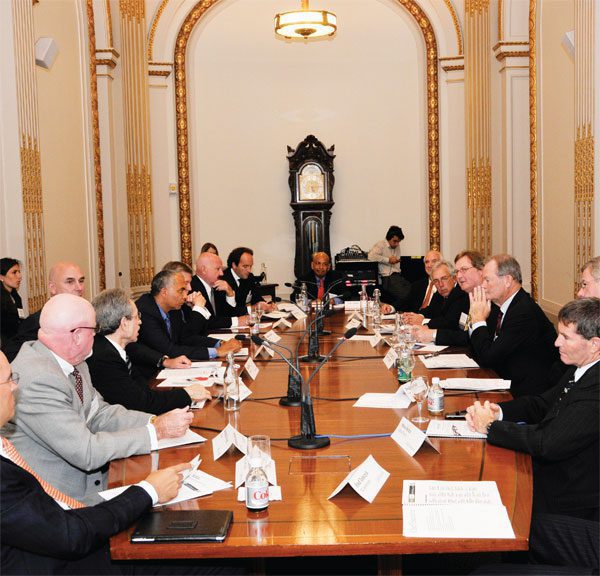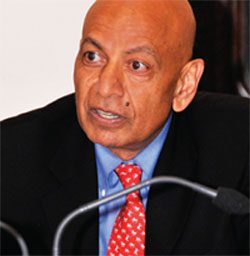
For the last decade, talk has swirled around the market potential of China—and for good reason. By far the world’s most rapidly growing major economy, China is fast on its way to becoming the world’s biggest luxury goods market. Chinese consumers already buy more cars than people in any other country, based on a forecasted 13.5 million in 2011 versus the 12.6 million that U.S. consumers are expected to purchase. What’s more, the country’s central government, which has demonstrated a formidable commitment to setting and achieving long-term goals, has made increasing domestic consumption a top priority.
“At the end of 2012, there will be a whole new generation of leaders coming through, and who they are and what they think will be a big determinant of how China goes forward.”
Given these facts, business leaders’ near-obsession with gaining a foothold in China is understandable. But a host of frustrations—from difficulty navigating the political landscape and hiring and retaining quality talent to intellectual property theft and onerous export controls—have long hindered global companies’ efforts to do business in China. And with China now poised for massive transformation, including a complete change of leadership in 2012, the hurdles are about to get a lot higher. “At the end of 2012, there will be a whole new generation of leaders coming through, and who they are and what they think will be a big determinant of how China goes forward,” Dr. Robert Lawrence Kuhn, senior advisor to the office of the chairman at Ernst & Young, told CEOs gathered for a Chief Executive roundtable discussion held in partnership with Ernst & Young.
In 2012, China will usher Xi Jinping, currently vice-chairman of China’s Central Military Commission, into the role of Communist Party Chief and a year later Xi will take over as president. Next year will also see a changeover in the nine-member Politburo Standing Committee—the apex of Chinese political power. At the same time, China continues to struggle to address the imbalances between rich and poor—in particular the challenge of transmigrating 400 million rural poor to urban areas. It also faces the prospect of a drop in the economic growth rate of 9 to 10 percent that it has enjoyed for nearly 30 years.
Even among experts on Asia, opinions differ on how these changes will play out. Anil Gupta, visiting professor at INSEAD and author of Getting China and India Right, sees a “better than 50 percent chance that the current political system doesn’t last.”
“Of the 10 percent growth rate in GDP, 1 percent has come from an increase in labor, about 5 percent has come from an increase in capital due to China’s capital investment and about 4 percent is from productivity growth,” he told roundtable participants, noting that the low-hanging fruit in both labor and capital has now been plucked. “If you look at the infrastructure spending, once you’ve built a high-speed train, do you [get the same return when you] build a second? China’s investment will continue but there is no reason to believe it will continue to increase. And the easy growth in productivity has been done, so there’s no reason to believe that will accelerate.”
“In China, you have capitalists working in a communist system; in Japan, you have communists working in a capitalist system.”
Anti-government protests are also on the rise in the China, added Gupta. “Unrest is no longer confined to rural areas, it’s now happening in urban areas among people who are educated,” he said. “Tensions in the society are increasing, and increasing rapidly, because what you have is an economic democracy. As a friend of mine in Tokyo once told me, ‘In China you have capitalists working in a communist system, in Japan you have communists working in a capitalist system.’”
Kuhn, however, predicts a period of caution during the political transition followed by a government movement toward a democratic approach more hospitable to foreign businesses. “The next generation of leaders are sophisticated and knowledgeable, and stability will be their highest priority,” said Kuhn, who is an advisor to the Chinese government and author of How China’s Leaders Think. “And with the high increase in standards of living, people have a lot to lose, so I really don’t see the kind of pressure that would lead to a super Tiananmen Square.”
Still, given China’s importance to today’s global economy, the very possibility is daunting. “Fifteen years ago it wouldn’t have mattered, but now it sure does,” said Brian Duperreault, CEO of Marsh & McLennan Companies. “This isn’t Egypt. This is a big deal.”
But the possibility of political unrest is just one of the challenges the changing landscape in China presents for companies doing business there, agreed CEO roundtable participants.

(From left to right) Fifth Street Capital’s Len Tannenbaum, Ernst & Young’s Sam Fouad, Met-Pros’ Ray De Hont, Monsanto’s Hugh Grant
While widely criticized, the U.S. regulatory environment can look logical and orderly when compared to China, where intellectual property theft has been rampant and environmental concerns have long taken a backseat to job and revenue creation. Copycatting and substandard manufacturing conditions are still concerns, but the dizzying speed of regulatory movements to rectify them can be nearly as unsettling—as can their favoritism toward state-owned and homegrown enterprises.
John Craig, CEO of EnerSys, recounted a recent experience with environmental policy. While the company employs U.S.- level environmental protection standards for its industrial battery manufacturing factories in China, many manufacturers there did not. “About a month ago, the government walked into more than 300 factories and said, ‘Close your doors,’” he reported, noting that the surprise inspection was reportedly a result of the fiveyear plan China debuted in March. “We were back up 24 hours later because of our standards, but out of those 300 factories only a handful are open today and probably 50 percent will never re-open.”
While EnerSys weathered that experience well, the incident raised concerns. “My question is are there other significant changes coming about which U.S. businesses should be aware?” he asked.
The answer appears to be yes. “You’ll want to watch out for new laws in mergers and acquisitions, which on the surface are designed to be anti-competitive,” responded Kuhn. “But a good piece of it is to protect Chinese companies from being squeezed off too early.”

“With the high increase in standards of living, people have a lot to lose, so I really don’t see the kind of pressure that would lead to a super Tiananmen Square.” —Dr. Robert Kuhn
Competition between local markets can also be a minefield for foreign companies looking to operate across China. “In the U.S., it doesn’t really matter if you’re in Illinois or Kansas in terms of policies, but in China it makes a huge difference because the power is centralized in the provinces,” explained Kuhn. “The provinces are really like independent countries, with tremendous deal-making power.”
Businesses should tread carefully as they expand into new provinces, as having won a special consideration from one province may translate negatively with its neighbor. “If you look at the competition between the Yankees and the Red Sox, that’s nothing compared to the provinces,” said Kuhn.
The bottom line? Businesses need to adopt a localized approach. “You see a very different market in Shanghai than in Chongqing,” agreed Nick Pinchuk, CEO of Snap-on. “This isn’t one $13 billion market, it’s several markets of a couple hundred million dollars that you have to deal with differently.”
Gone are the days when global businesses could hire English-speaking Chinese talent for a song. “The price we’re paying for a programmer at one of our companies is almost the same in the U.S. as it is in Beijing,” reported Leonard Tannenbaum, CEO of Fifth Street Capital. “If you’d told me that five years ago, I’d have said, ‘You’re crazy.’ And the price of manufacturing is so crazy in China now that people are going to Thailand and elsewhere.”

“There’s a better than 50 percent chance that the current political system in China doesn’t last.”—Anil Gupta
Rising demand has also brought a war for talent. “People are, frankly, totally underqualified for the roles they’re getting,” says Douglas Trough, CEO of International Flavors and Fragrances. “If you can speak English and Chinese and have any Western training, you’re just constantly moving on because a lot of companies are squabbling over a very small supply of people.”
Nationalistic pride intensifies that retention challenge, added Sam Fouad, Americas emerging markets leader at Ernst & Young. “The nature of loyalty in China is associated more with working for a state-owned enterprise than with staying with the brand where you began.”
“In the old days a foreign company was the place to be because you were going to learn, but today they would rather work for a state-owned enterprise,” agreed Duperreault. “As far as they’re concerned that’s where the action is and where the power will be—and that’s an issue for all of us. At the end of the day you need Chinese people working in your company and it’s going to be harder and harder to acquire those people.”
Ultimately, however, it’s a challenge businesses must figure out how to overcome, he added. “China is big and it’s only going to get bigger, whether it grows at 9 percent or 5 percent. That’s not the question; the question is: ‘Will my company be big in China?’ You need a strategy.”
It’s also becoming increasingly apparent that attempting to translate strategies proven successful in the West is not the answer. “China is changing faster than any country in the history of the planet, so the management playbook that we learned in the West will be of limited use,’ summed up Pinchuk. “So one of the biggest challenges in China is giving up those lessons and having a completely different culture in terms of how to approach business.”

Marsh & McLennan’s Brian Duperreault, International Flavors & Fragrances’ Douglas Tough, Di Z gital Power’s Amos Kohn and TD Ameritrade’s Fred Tomczyk
John Allen, Chairman & CEO, Greater China • John D. Craig, Chairman, President & CEO, EnerSys • Raymond J. De Hont, Chairman, President & CEO, Met-Pro • J.P. Donlon, Editor-in-Chief, Chief Executive • Brian Duperreault, President & CEO, Marsh & McLennan Companies • Sam Fouad, Americas Emerging Markets Leader, Ernst &Young • Hugh Grant, Chairman, President, & CEO, Monsanto • Anil Gupta, Michael Dingman Chair in Global Strategy & Entrepreneurship Smith School of Business University, University of Maryland • David Johnes, Global CEO, Havas Worldwide • Amos Kohn, President & CEO, Digital Power • Dr. Robert Lawrence Kuhn, Senior Advisor, Office of the Chairman Ernst & Young • Nicholas T. Pinchuk, Chairman, President & CEO, Snap-on • Dr. Thomas J. Saporito, Chairman & CEO, RHR International • Leonard Tannenbau, CEO, Fifth Street Capital • Frederic J. Tomczyk, President & CEO, TD Ameritrade Holding Corporation • Douglas D. Tough, Chairman & CEO, International Flavors & Fragrances

Chief Executive Group exists to improve the performance of U.S. CEOs, senior executives and public-company directors, helping you grow your companies, build your communities and strengthen society. Learn more at chiefexecutivegroup.com.
0

1:00 - 5:00 pm
Over 70% of Executives Surveyed Agree: Many Strategic Planning Efforts Lack Systematic Approach Tips for Enhancing Your Strategic Planning Process
Executives expressed frustration with their current strategic planning process. Issues include:
Steve Rutan and Denise Harrison have put together an afternoon workshop that will provide the tools you need to address these concerns. They have worked with hundreds of executives to develop a systematic approach that will enable your team to make better decisions during strategic planning. Steve and Denise will walk you through exercises for prioritizing your lists and steps that will reset and reinvigorate your process. This will be a hands-on workshop that will enable you to think about your business as you use the tools that are being presented. If you are ready for a Strategic Planning tune-up, select this workshop in your registration form. The additional fee of $695 will be added to your total.

2:00 - 5:00 pm
Female leaders face the same issues all leaders do, but they often face additional challenges too. In this peer session, we will facilitate a discussion of best practices and how to overcome common barriers to help women leaders be more effective within and outside their organizations.
Limited space available.

10:30 - 5:00 pm
General’s Retreat at Hermitage Golf Course
Sponsored by UBS
General’s Retreat, built in 1986 with architect Gary Roger Baird, has been voted the “Best Golf Course in Nashville” and is a “must play” when visiting the Nashville, Tennessee area. With the beautiful setting along the Cumberland River, golfers of all capabilities will thoroughly enjoy the golf, scenery and hospitality.
The golf outing fee includes transportation to and from the hotel, greens/cart fees, use of practice facilities, and boxed lunch. The bus will leave the hotel at 10:30 am for a noon shotgun start and return to the hotel after the cocktail reception following the completion of the round.